40th anniversary - resources
|
NLS celebrated its 40th Anniversary on January 30, 2014, with a packed Symposium on Access to Justice and Delivering Frontline Services in the 21st Century. Our thanks to all the participants and attendees for making the event such a success! Please scroll down to view documents and photos, as well as professionally edited videos of the entire Symposium produced by the talented folks at Regent Park Focus. We hope you'll enjoy these materials, and please feel free to use them with attribution for any lawful non-commercial purpose.
photos
videos
Presentation by Professor Mary Jane Mossman: A Short History of Legal Aid
Presentation by Ed Montigny: Canadian Bar Association's Report on Access to Justice
Access to Justice Panel Part 1: Doug Ewart
Access to Justice Panel Part 2: Bob Ward
Access to Justice Panel Part 3: Patricia Hughes
Access to Justice Panel Part 4: Kathy Laird
Keynote Address by Angela Robertson
Presentation by Jack de Klerk: Where to from here? Notes on the GTA Clinics Transformation Project
Panel on Providing Frontline Services in the 21st Century: Lenny Abramowicz, Jehad Aliweiwi, JoAnne Doyle, Dr. Nav Persaud, and Haweiya Egeh, plus closing remarks by Melodie Mayson
documents
ATTORNEY GENERAL OF ONTARIO THE HONOURABLE JOHN GERRETSEN CONGRATULATES NLS
Agenda: NLS 40th Anniversary Symposium
A SHORT HISTORY OF LEGAL AID IN ONTARIO by Professor Mary Jane Mossman
Osgoode Hall Law Professor Mary Jane Mossman kicked off NLS's 40th Anniversary Symposium with a fascinating history of legal aid services and community clinics in Ontario, from its humble beginnings during the Second World War to the present-day system. You can read Professor Mossman's paper on our website here or download a .pdf copy here. WHERE TO FROM HERE? NOTES ON THE GTA CLINICS TRANSFORMATION PROJECT by Jack de Klerk, Director of Legal Services at Neighbourhood Legal Services
NLS Director of Legal Services is the Co-Lead for the GTA Clinics Transformation Project. He presented an overview of the Project at NLS's 40th Anniversary Symposium on Access to Justice and on Delivering Front line Services. You can read the presentation paper on our website here or download a .pdf copy here. |
|
ABOUT THE SYMPOSIUM
Click here to read short biographies for each of our speakers! Panel 1 Précis: Access to Justice The income gap between those who can routinely pay for legal services and those who qualify for legal aid is widening as prices for legal services increase and financial eligibility guidelines remain stagnant, fixed at levels already too low in the last century. The judicial system at the same time seems to have been hijacked by those with money: those who have the means can hire lawyers to translate and navigate the requirements to be met in pursuit of rights or claims and they have the capacity to ride any wave of misfortune. Those without means and without a legal aid assistant enter the system to the chagrin of regular participants; even if they are able to persist their outcomes are seldom positive. Anyone without means and/or with an urgent problem is very likely to be frustrated. The capacity within the civil legal aid community has been seriously eroded in the past decade. Burgeoning problems and funding restrictions have narrowed the availability of services dramatically to the point that few clinics are able to provide substantive legal services outside cases involving “irretrievable” benefits (eviction from subsidized social housing, loss of welfare or disability benefits, loss of status and deportation). By far, most clinic cases today face a “government” lawyer or agent on the other side. This is the state of access to justice today. What strategies can be developed to make justice more accessible? Panel 2 Précis: Delivering front line services Service deliverers face pressures that pull them in different directions: scarcer funding means “doing more with less” and more clients with increasingly complex needs means it “takes more to deal with fewer clients”. While organizational leaders continue to rattle the cages of funders to provide more, program managers and front line workers are left to face the every day realities of providing service. There is wide spread recognition of deepening poverty in our community and its increased racialization, of the social determinants of health and well being, and of the cascading effect of problems. These are deeply systemic problems but they and their consequences present through many of our clients in our offices every day. Case management, holistic service, service hubs, service co-ordination, self help and greater use of technology are but a few of the code words used to describe or encourage alternate ways of working that will (?) help alleviate the pressure. What are effective strategies for more effectively working with our clients and for supporting our workers? Click here to read short biographies for each of our speakers! |


